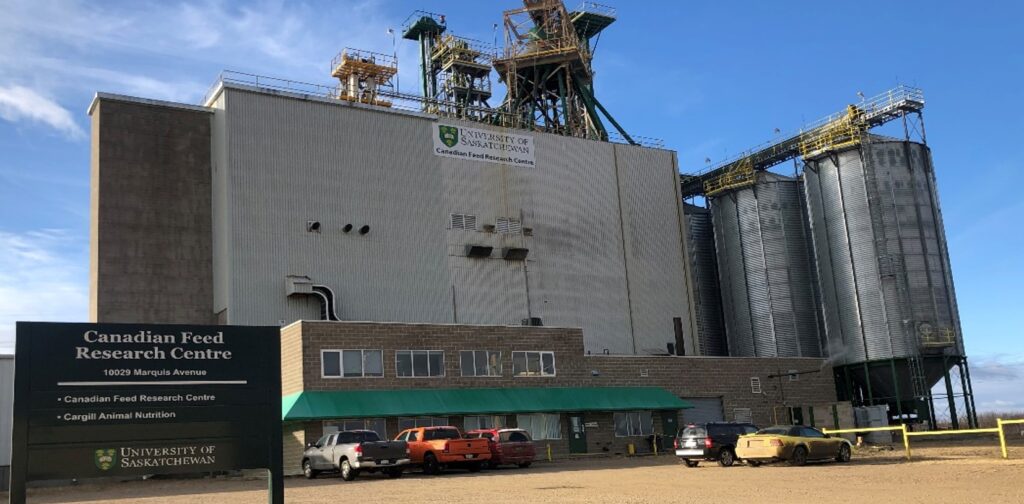When crops are processed into food ingredients and other products, there is always ‘waste’ material left over that needs to be dealt with.
The ‘waste,’ called by-products or co-products, has a lot of nutritional value left and can often be turned into livestock feed or pet food, but it takes work (and money) to figure out the best way to do that. Small companies may be tempted to just dump the material—but sending it to the landfill is neither economically efficient, nor environmentally responsible.

Dr. Rex Newkirk, Associate Professor at the University of Saskatchewan and Ministry of Agriculture Research Chair, Feed Processing, says there’s expert assistance available for small companies trying to figure out what to do with the co-products. The Canadian Feed Research Centre (CFRC) at the University of Saskatchewan is receiving funding support from the National Research Council of Canada Industrial Research Assistance Program (NRC IRAP) to help companies to do this work at reduced cost.
“The support we are receiving from NRC IRAP helps offset a portion of the costs for SMEs accessing our services and we can do the majority of the work for very little added cost to firms,” he says.

Newkirk and Jessica Wang, Specialist, Project Management and Business Development at CFRC, want people to know the capabilities of CFRC.
CFRC is a national research centre at the University of Saskatchewan (USask). It has a full range of feed manufacturing capacity that it uses to assist innovative product development and testing for Canadian small and medium enterprises (SMEs). The Centre has an extensive range of equipment, including pellet mills, hammer mills, roller mill, mixers, steam explosion system, extruder, steam flaker, briquette maker, vacuum coaters, and inline Near-infrared spectroscopy (NIRS) monitor.
A team of feed industry and academic experts liaise with USask faculties to offer research and development guidance, regulatory advice, and contractual trials for public and private sectors.
Wang is able to access a wide range of expertise on campus, including animal research units such as the Rayner Dairy Research and Teaching Facility, Poultry Centre, and Animal Care Unit to conduct in vitro, in situ, and in vivo animal trials.
Feeding studies can range from in vitro, to digestibility and animal trials. “We need to determine how well the animals are going to eat it,” says Newkirk. “Are they going to grow? Are they going to produce meat, milk and eggs – that kind of thing.”
The feed industry is heavily regulated, and navigating that system can be challenging, time consuming, and costly for a small company. “One of the things that Jessica specializes in is working with CFIA [Canadian Food Inspection Agency] to get through that regulatory process,” says Newkirk.
Wang says the organization can help a broad range of companies. “Thanks to our relationship with NRC IRAP, we have a variety of inquiries from different parties and are able to help those companies with initial testing and bringing their products to market.”
She says CFRC clientele includes not only feed companies, but local farmers, pet food companies, and energy companies that are looking for solutions to grow their business by developing new products from agriculture co-products. “We also have clients from animal health product companies who want to achieve the homogeneity and stability data of the feed additives to proceed with the feed registration process in Canada and the USA.”
Newkirk says the NRC IRAP funding is enabling the CFRC to work with companies at an earlier stage than they might usually engage with, allowing them to capture new opportunities that they may otherwise have missed.
The Centre is unique in several ways. “There’s no other feed processing centre like it in Canada, that’s for sure. Most universities have sort of the bare minimum of feed processing,” says Newkirk.
And although there are other feed processing centres in North America, CFRC is unique for its scaling capabilities, with three scales of production.
“We have everything from small scale right up to industrial. We can do small batches as low as 20kg and industrial trial up to 20 tonne per hour. Many centres will be focused on either really small scale, or intermediate scale; we have the full range.”
Along with having access to all the resources at USask, CFRC can tap other organizations in the Saskatchewan bioscience research cluster for expertise, like Saskatchewan Food Industry Development Centre, where they can access experts on extrusion, for example.
CFRC has clients from across Canada, and globally too. Newkirk lists China and Italy as two countries that have accessed CFRC expertise; Newkirk recently taught at a pet food conference and a summer school in Italy, both online.
Another unique thing about CFRC is that clients are encouraged to be there when the various processes are being run, says Newkirk. “If they can’t, we’ll certainly do it without them. But I like having them in there, we’re happy to have them. I like working with SMEs, they’re innovative. They’re…you know, they’re entrepreneurs, right?”
Photo: Supplied by Canadian Feed Research Centre



